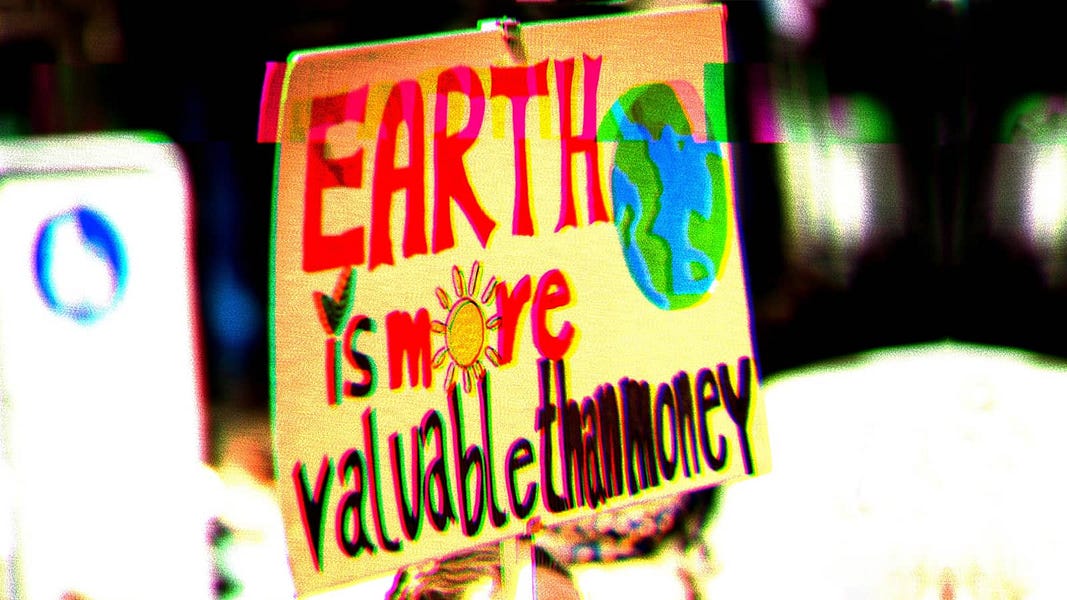The Problem with Conscious Capitalism.
ESG, SRI and FMF.
 Image Description: Protest sign that says, "Earth is more valuable than money," with a drawing of the earth.
Image Description: Protest sign that says, "Earth is more valuable than money," with a drawing of the earth.
Conscious Capitalism as a concept—not the organization that was trademarked and based on a book of the same name—is an idea formulated by Whole Foods’ founder John Mackey and professor Raj Sisodia.
Here’s the textbook definition:
“The conscious capitalism credo acknowledges that while free-market capitalism is the most powerful system for social cooperation and human progress, people can aspire to achieve more. It does not minimize profit-seeking but encourages the assimilation of all common interests into the company's business plan.”
“Conscious Capitalism”
I’ve said it before, I like Whole Foods. No. I fucking love Whole Foods because I’m a bougie coastal lib. Also, I fucking hate this guy with all my bougie might. He’s another one of these free market shills who has cherrypicked Adam Smith to suit his business model and believes in the almighty libertarian philosophy of leave-me-the-fuck-alone and let the free market decide our fate.
I’m going to do something here that is a little out of format for us because I came across a clip of Mackey speaking about capitalism that is so utterly craven in its attempt to misdirect and propagandize capitalism, it’s stunning. We’re going to break down the highlights to show you what a master propagandist does and why Mackey’s notion of Conscious Capitalism is so fucking dangerous.
For good measure, Unf*ckers, old Mackey the Knife is also a big fan of Uncle Milton. Before we open Mackey’s mouth and dump down his neck, let me assure you that there are really good companies out there “doing the work.” Companies that truly honor diversity and equity, organizations that exist to improve and enrich the lives of their employees and their customers, and even a precious few that make the world a better place.
We’ll talk about these companies and some authentic movements toward a higher consciousness in business, but Mackey’s version ain’t it.
Before I do, you might be thinking, “What’s the big fucking deal, Max? Why go after purportedly good companies that are trying to elevate consciousness and behave in a more ethical manner?”
It’s a fair question. Essentially, it comes down to this. Conscious Capitalism as a precept is wholly voluntary. As such, it makes it prone to greenwashing and manipulation because, absent a consistent regulatory framework to prevent the blind accumulation of wealth, corporations will cut corners and play to our worst tendencies. Mackey characterizes this as a misplaced obsession of intellectuals, jealous of their diminished social standing next to the monied class. And as usual, he leans on the classic trope that innovation and the betterment of humanity is a direct result of capitalism. Let’s dig in:
Mackey: “Intellectuals have always disdained commerce…Intellectuals have always sided kind of with the aristocrats to maintain a society where the businesspeople were kind of kept down. You might say that capitalism was the first time the businesspeople kind of caught a break because of Adam Smith and the philosophy that came along with that and the Industrial Revolution began this upward surge of prosperity.”
Okay, so he begins with his disdain of the intellectual class and invokes Adam Smith, the economist most associated with our modern notion of capitalism. In our Capitalism essay, we unpacked a fair bit of Smith along with his contemporaries, and one of the conclusions that we drew was that anti-intellectual sentiment is distinctly counter to Smith’s notion of progress.
This is a fairly modern perversion of his work. In fact, Smith believed that two of the primary outcomes of a proper capitalist model are the ability to create a generalized welfare state where no one falls through the cracks and that it is the responsibility of wealthy individuals to support intellectualism, academia and the arts.
The second part of his thesis, that the Industrial Revolution ushered in a surge of prosperity, is somewhat belied by the facts. The Industrial Revolution was anything but a capitalist endeavor if the goal, according to Smith, was to create a generalized welfare state. Smith and nearly every other theorist, including our beloved Milton, also understood that any system that allowed for monopolies to exist and drive commerce was decidedly anti-capitalist.
This period, which Mackey credits as a corollary of capitalism, was rife with monopolies that created horrific conditions for the working class and was marked by a new kind of abject poverty and health concerns that related to industrialization. It was also, until the past few decades, the largest period of inequality. As we addressed previously, one of the limitations of Smith was his agrarian-centric philosophy, which is why the Industrial Revolution gave rise to the theories of Marx and Engels and the need for a more human approach to capital.
Next, the interviewer sets up Mackey to explain why entrepreneurs who find success try to game the system when they’re at the top:
Mackey: “I don’t know if it’s a psychological switch so much as that they necessarily weren’t grounded in the philosophy of capitalism, they weren’t necessarily advocates of the free-market. They were just advocates of their own advancement, their own personal enrichment. And so I think oftentimes they don’t make a distinction between when they’re entrepreneurs on the way up versus when they’ve arrived and they’re attempting to not fall so they rig the game and we have crony capitalism that way.”
Here, Mackey introduces the idea of crony capitalism, which he is railing against as if to say, no, no, no, that’s not the way to do this. The question is directed at the businessperson who makes it big then fights to essentially hoard wealth and game the system. So-called crony capitalism refers to corrupt bargains between government and big business, so I have a problem with appending the word capitalism to this concept at all. So let’s start there. What this should really be called is a plutocracy, which is indeed much closer to what we have today.
As we’ve argued before, very little of what Mackey refers to as capitalism—the complete absence of government intervention or regulation or the idea that on their own successful entrepreneurs will somehow NOT try to game the system in their favor—is a fantasy. So Mackey is really just confusing the issue with a misdirect, either because he doesn’t understand the economics of capitalism or it’s on purpose.
The next stretch of the interview is a discussion about minimum wage and a fictitious employee named Tom. Should Tom work at ten dollars an hour or ten cents an hour? The government wants to mandate 15 an hour and that’s just not fair, because in Mackey’s purple sky planet, he should be able to pay what the market will bear because Tom can choose to work elsewhere.
The standard argument that workers have the freedom to choose any job they wish because of market freedom. No one in Mackey’s world has any restrictions on movement or conditions. I’m going to show his response to this and then compare it to what another CEO that will be important to us had to say:
Mackey: “The competition between employers sets wages. When the government sets it, it’s inevitably going to screw it up, it’s going to set them too high and so a company like Whole Foods Market—if let’s say the minimum wage is $15 but Tom’s only worth $10 to us—what we’ll do is we’ll restructure our marketplace so that we’ll provide less service. We’re actually a very high service supermarket but if they make service too expensive so our customers aren’t willing to pay for it, then the rational, logical thing to do would be to cut back, do less service, do more self-service, make people queue up in lines longer so that we can keep our labor cost under control.”
What a dick. This other company was faced with a similar problem. In order to create the least harmful product with the best sourcing possible and to compensate people fairly in the process, they knew it would be more expensive. Without yet giving away his identity, here’s what this CEO had to say:
Other, Better Human Person: “Over the years…we’ve pretty much cleaned up our whole supply chain. It’s more expensive to do that, but as it turns out, our customers really appreciate that. They appreciate that we’re doing all the work for them and sorting out what’s the least harmful way to dress.”
We’ll talk about Other, Better Human Person later, but the point is that this guy understands that in a premium brand built with mission and purpose in mind, customers are willing to accept higher prices. Let’s finish with Mackey and his theory of Conscious Capitalism before we widen our lens a bit and incorporate some additional concepts. Back to the interview:
Mackey: “If you mandate certain benefits then the cash compensation is going to be less. Oftentimes you’ll see studies that show that real wages are stuck. Real wages and benefits aren’t stuck but you don’t necessarily see that.”
Ah, the old “but their benefits” argument. On this, dear Unf*ckers, we get to just call bullshit. In the three decades following World War Two, hourly compensation of workers rose 91% in line with productivity growth. But since the ’80s, hourly compensation for a typical worker rose 9%, while productivity increased 74%. This gap now includes college and non-college educated workers, blue collar and white collar, because over the past decade, the wage gains have gone exclusively to the top 1% with CEOs taking an outsized piece of even that sliver of pie. Oh, and these figures include wages and benefits. So he’s just lying.
Mackey also spends a good chunk of time complaining about Obamacare during the interview. What’s so fucked up about his entire premise is that Whole Foods Market’s best years were under Obama, by a fucking long shot. Mackey’s company reached almost $900 million in profits under Obama then dropped to half a billion in Trump’s first year before he sold the company to Dr. Evil Bezos.
We’ll Do Better. We Promise. Trust Us.
There’s more fuckery in this interview, but you get the picture. This is the false prophet behind the movement that is Conscious Capitalism. Before we leave Mackey, let’s look at the official Conscious Capitalism organization for a moment, since it’s yet another entrepreneurial enterprise seeking to capitalize on the push for deregulation and free markets.
The board of directors of the organization has some pretty awesome figures on it. People like Safwan Shah of PayActiv, Joseph Kenner of Greyston Bakery and Bert Jacobs from Life is Good. Solid companies that help lift people out of poverty, provide livable wages, or companies deeply committed to equity or sustainability.
It also boasts directors like the CEO of plastic goods retailer The Container Store and DTE Energy, a fossil-first company that has racked up more than $17 million in environmental fines since 2000.
And there’s the problem with an entirely voluntary movement that relies on our so-called better angels to lead the way. For every Greyston Bakery that is doing truly mind blowing work to alleviate poverty and reshape the way we think about employment in this country, there’s a company that knows how to work the system and greenwash their terrible actions that harm people and planet.
Ah, yes. Let’s go back to the identity of Other, Better Human Person CEO, arguably the most admired executive in America: Yvon Chouinard, founder of Patagonia. Here he is talking about profits in the context of Patagonia’s mission:
Chouinard: “My livelihood is based on people going into the outdoors. I feel like I have more responsibility than the average person in protecting the outdoors. And so we donate one percent of our sales [to an organization called 1% For The Planet], so this means that even if we have a nonprofitable year, we still have to give the money away. I don’t look at it as philanthropy. It’s a cost of doing business. It’s the cost of using up non-renewable resources. It’s a cost for living on this planet.”
I honestly think that most CEOs, most entrepreneurs, small business owners, anyone responsible for a company and people’s livelihoods, want to be Yvon Chouinard. But it’s hard. It takes time. And sometimes you have to sacrifice profit in order to attain this level of success and pure goodness in world. And we’re still talking about a company that has a footprint. It’s not perfect, but its ethos is such that it’s always striving to be perfect or, at a minimum, do no harm. Protect the people and the planet that sustains them.
And when other CEOs cry that they have to protect profits at all costs, the maxim propagated by uncle dickhead, I refer you back to our Corporate Irresponsibility essay where we demonstrated that these are the same CEOs that are holding ten trillion dollars offshore to avoid and evade paying taxes in the United States.
Lipstick on a Pig
Conscious Capitalism™ isn’t the only movement or initiative to clean up the image of capitalism in the U.S. There’s a growing trend in the investment community, for example, to divest of companies in portfolios that trade in certain industries. Several of the largest investment vehicles have eliminated firearm manufacturers, while others have even removed fossil fuel companies from their strategies.
The two primary investment concepts are generally referred to as ESG and SRI. The former stands for Environmental, Social and Governance. The latter for Socially Responsible Investing. ESG is a wide net fairly open to interpretation. It’s a welcome trend in that it helps divert meaningful investor cash away from traditionally harmful industries, but deeper examination proves that it’s mostly performative.
All you have to do is look at the mother of all managers, Vanguard. Vanguard dipped its toe into ESG, and so far it's performed admirably, though it’s young. As of this month, it has slightly more than $13 billion in assets and this year has returned over 10%. First off, $13 billion is, as we say, pissing in the ocean to warm it up. But, hey, it’s a start. And a 10% return ain’t too shabby, though it’s underperforming the S&P 500. Oh well. At least it’s investing in good companies that make the world a better place, right? Sure.
Let’s look at their top ten holdings that make up 30% of the assets.
-
Apple
-
Microsoft
-
Amazon
-
Facebook
-
Alphabet (that’s Google)
-
Alphabet Class C shares
-
Tesla
-
JPMorgan Chase
-
Visa
-
UnitedHealth
Okay, maybe they’re an outlier. Let’s look at Calvert’s top ten holdings, because they specialize in responsible investing.
-
Apple
-
Microsoft
-
Amazon
-
Alphabet
-
Tesla
-
JPMorgan Chase
-
Visa
-
Disney
-
NVIDIA
-
Mastercard
Shit. Wait, wait, wait. I know. Let’s look at BlackRock. Huge firm, top of the top. They too have an ESG fund.
-
Apple
-
Microsoft
-
Amazon
-
Alphabet
-
Facebook
-
Alphabet Class C
-
JPMorgan Chase
-
Tesla
-
NVIDIA
-
Johnson & Johnson
See where I’m going with this?
Socially Responsible Investing was intended to be more deliberately focused. An effort to try and promote direct investment into change agent industries like renewable energy companies. Now, there are a number of private equity and venture capital firms that do this with intent. On the whole, the impact is marginal, but it’s real. For the most part, SRI has mixed with ESG and the big boys have taken over.
Koch Suckers & Dow Fuckers
Let’s go a step further to explore another level of hypocrisy and bullshit. You learned a bunch of this in the two parter on Corporate (Ir)Responsibility, so this is just another twist of the knife. Let’s pick two companies that make the list of the top 100 corporate air polluters and toxic companies in the United States. Dow Chemical and Koch Industries.
Let’s start with Koch Industries because we all fucking know how shitty they are. We’ve covered their malfeasance before as the most pernicious polluter and politically abhorrent company maybe ever. Here’s the opening salvo of their corporate responsibility statement:
“For us, creating value goes far beyond economic performance. It means doing the right thing. In the right way. Always. For our customers. For our employees. For our communities. For our environment.”
Give me a fucking break.
The EPA, in its infinite wisdom, has even bestowed awards on some Koch divisions, which they tout endlessly on their website.
Here’s the lede on Dow Chemical’s fucking sustainability page:
“We believe the next breakthrough is only a moment of inspiration away and that many perspectives—united in partnership—will make it a reality. That principle informs our full-hearted commitment to collaboration, research, diversity, and sustainability.”
You can’t see me, but I’m smashing my head on my desk.
This with a straight face, after settling with the EPA and Justice Department in January of this year for a cool $294 million, stemming from violations in Texas and Louisiana for flaring practices at petrochemical plants that spew volatile organic compounds into the air.
ESG, SRI, Impact Investing, these buzzwords have caused a great deal of consternation among conservatives and liberals who have called bullshit. It’s one of the only times I can recall being aligned with a douchebag like John Stossel. Libertarians like Stossel object to the fanciful nature of anything that destroys free will among the business class. They see this is a way for people like Al Gore to line his pockets by selling snake oil that meddles with the free markets. Liberals that call bullshit do so over the performative nature and know this is a scam to line the pockets of Wall Street firms that are just packaging the same shit under a different name. They’re both right, but they’re both missing the larger picture.
We need systemic change. All around us, even in areas of industry that have made great advances, we have miles to go. Sustainable farming, free range poultry, organic produce are all improvements on a system that is still overwhelmingly contributing to climate change. Cleaning the oceans will require more than cutting plastic six pack rings or ditching straws. We need a wholesale change to eliminate all single use plastics. Fast fashion is not only bad for the environment, it's bad for workers. Here again there are solid trends emerging like secondhand marketplaces such as Poshmark or thredUP, or companies with outstanding practices like Patagonia or Eileen Fisher.
Consumers and businesses can choose to work with B Corps, one of the more wholesome and positive business trends that measure companies on very high standards of environmental impact and DEI initiatives. You can buy your books on Bookshop.org—instead of Amazon—like we promote on Unf*cking the Republic. You can rent things like dresses from Rent the Runway or tools from Home Depot instead of buying them. You can buy local. Only purchase Fair Trade items. Go vegan. Find cruelty free products on the Leaping Bunny app.
As consumers, we do have options, but they’re not entirely mainstream, which means they lack the convenience that Americans demand. It is what it is. You’re not going to change our behavior because we’re the worst.
The corporations have had it their way. And like many movements, the pendulum has swung so far in their direction that it’s time to bring it back. Some would have you believe that Conscious Capitalism™ is indeed just this. That it’s corporate America’s way of reversing the tide to right itself. It’s not.
I applaud companies like Patagonia and Bombas Socks that have the fortitude to go on authentic journeys, but the inevitable greenwashing, performative corporate bullshit sheen is already taking root.
Voluntary goodness is not a thing. Not among the big guys. The big guys have sustainability departments, DEI divisions, compliance personnel and the gravitas to make progress, but only to a point. They will always opt to minimize structural change and maximize the publicity surrounding it. Trust me. Because they know this much. In a news cycle with a ten second attention span, they can probably wait out any negative impact and just pay the fucking fine, whatever it’s for.
As I mentioned up top in the essay, this is our final building block before tackling the whole of neoliberal economic policies as it relates to the Chicago school of economics. The reason I wanted to include this is because the greenwashing and performative change, particularly on the DEI front and as it relates to sustainability, are largely publicity stunts designed to avert our eyes from the wholesale destruction of the planet and the ongoing repression of the working class in this country. It gives us yet another headline news items to fight over to distract from the real work that is required to save the fucking planet, end homelessness and food insecurity, and provide a living wage.
America isn’t capitalist. There’s only one Yvon Chouinard. Your 15 minutes are up, Milton.
Here endeth the lesson.
Max is a basic, middle-aged white guy who developed his cultural tastes in the 80s (Miami Vice, NY Mets), became politically aware in the 90s (as a Republican), started actually thinking and writing in the 2000s (shifting left), became completely jaded in the 2010s (moving further left) and eventually decided to launch UNFTR in the 2020s (completely left).


